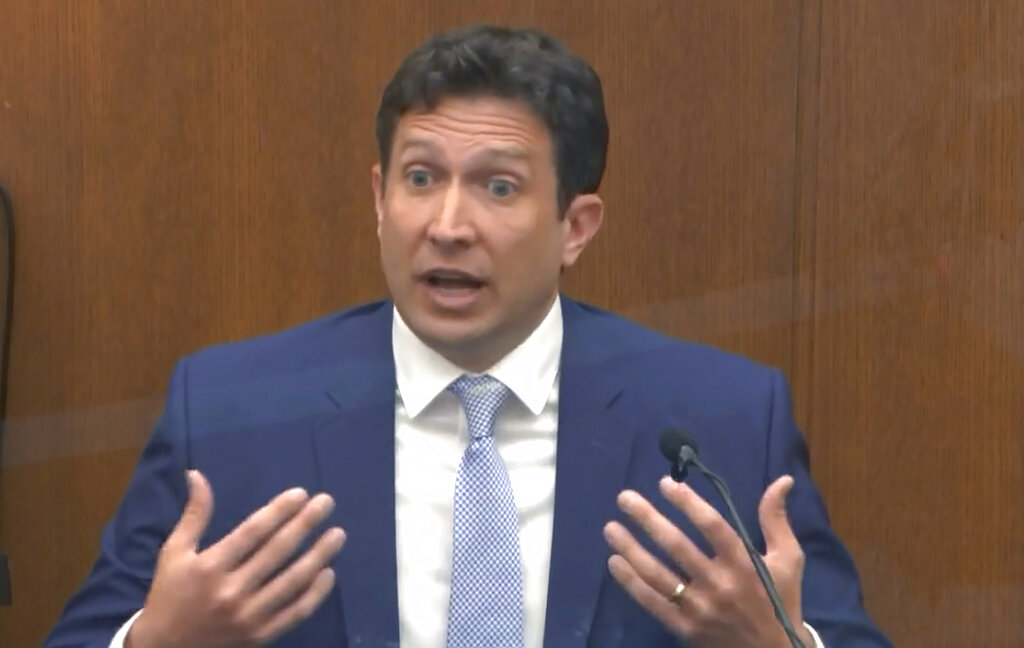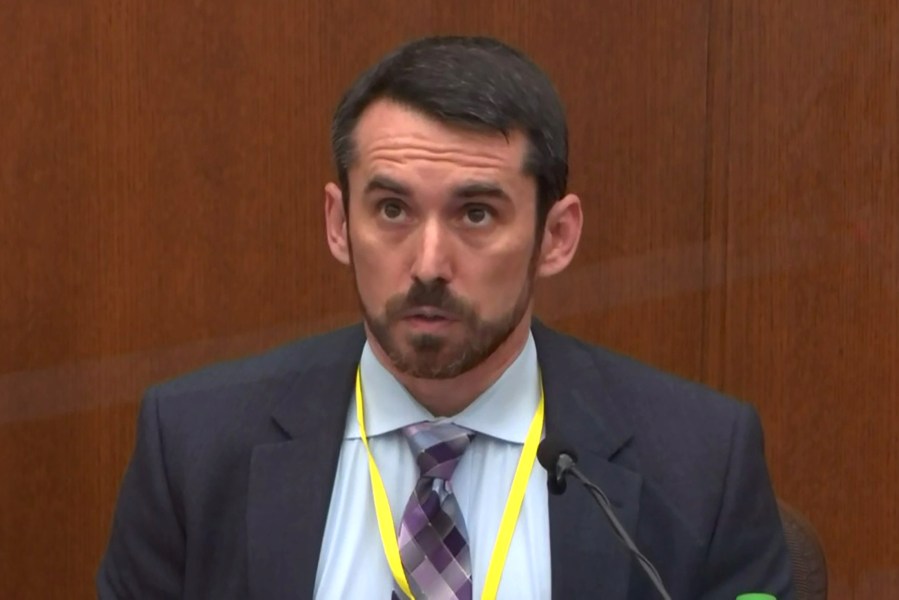Chauvin trial: Ex-cop did not take actions of ‘reasonable officer’; judge refuses to sequester jury
MINNEAPOLIS (NewsNation Now) — Prosecutors’ case against former Minneapolis police officer Derek Chauvin drew toward a close Monday with tender memories from George Floyd’s younger brother and testimony from a police use-of-force expert who said no “reasonable” officer would have done what Chauvin did.
The day began when Judge Peter Cahill denied a defense request to sequester the jurors after police in a neighboring city fatally shot a Black man. Cahill said he will not sequester the jurors until next Monday when he anticipates closing arguments will begin. He also denied a request to question jurors about what, if anything, they may have seen about unrest following Sunday’s police shooting of Daunte Wright in Brooklyn Center.
NewsNation will provide live coverage of the trial online and the NewsNation Now app. You can watch the trial here.
Former Minneapolis police officer Derek Chauvin‘s lead lawyer, Eric Nelson, made the request. He argued that the jurors could be influenced by what might happen with the unrest. The city of Minneapolis declared a state of emergency and a curfew for Monday.
The ruling came as the trial entered its third week, with prosecutors expected to rest their case on Tuesday, after which the defense will begin presenting its side. The prosecution has built its case on searing witness accounts, experts rejecting Chauvin’s use of a neck restraint, and medical authorities attributing Floyd’s death to a lack of oxygen.
DR. JONATHAN RICH, CARDIOLOGIST
Jonathan Rich, a cardiologist and medical school professor at Northwestern University in Illinois, was the seventh and final medical expert called by prosecutors.

Rich echoed the testimony already given by a pulmonologist, toxicologist, forensic pathologist and others in supporting the conclusion last year by the Hennepin County chief medical examiner that Floyd’s death was a homicide at the hands of police.
“I can state with a high degree of medical certainty that George Floyd did not die from a primary cardiac event, and he did not die from a drug overdose,” Rich told the jury.
There were several moments when Chauvin could have saved Floyd’s life, Rich said: by not pinning him into the ground with his knee in the first place; by moving Floyd out of the prone position; or by beginning to give Floyd chest compressions once another officer noted Floyd’s heart had stopped beating.
Rich, who specializes in heart transplant surgery, said Floyd’s heart was slightly enlarged but had no pre-existing heart issue, and so a heart attack was ruled out.
“Every indicator is that Mr. Floyd had an exceptionally strong heart,” Rich testified.
Philonise Floyd, George Floyd’s brother
In a quirk of Minnesota murder trials known as “spark of life” testimony, Floyd’s brother Philonise Floyd testified Monday and lovingly recalled how George used to make the best banana mayonnaise sandwiches and the way George used to mark his height on the wall as a boy because he wanted to grow taller.

Philonise Floyd shed tears on the witness stand as he was shown pictures of his late mother and a young George Floyd.
“That’s my oldest brother George. I miss both of them,” the 39-year-old said.
Philonise Floyd described growing up in a poor area of Houston with George and their other siblings.
“He used to make the best banana mayonnaise sandwiches. And he used to make the best syrup sandwiches because George couldn’t cook, he couldn’t boil water,” he said.
He said that as a child, George used to mark his height on the wall, because he loved sports and wanted to grow taller.
The defense did not ask Philonise Floyd any questions. Chauvin’s lawyers have said in court filings they intend to address the alleged meaning of a slang term used by Floyd during his arrest: “hooping.”
Chauvin’s lead lawyer has argued that when Floyd is heard in body-worn camera footage telling police he “was just hooping earlier,” he was using a term referring to taking drugs rectally, which prosecutors have denied.
After showing photographs of a young George Floyd dressed in an orange basketball uniform, prosecutor Steve Schleicher asked Philonise: “When he would talk about playing basketball, would he use any particular term or phrase?”
“He said, ‘Let’s go hooping,’” Philonise Floyd replied. “We always went hooping. You have to hoop every day. If you don’t go and shoot a whole bunch of shots, like 50 to 100 shots a day, my brother would say he would never be able to compete.”
SETH STOUGHTON, NATIONAL USE OF FORCE EXPERT
Seth Stoughton, an associate professor at the University of South Carolina School of Law, testified Monday on national use-of-force standards by law enforcement.
Stoughton judged Chauvin’s actions against what a reasonable officer in the same situation would have done, and repeatedly found that Chauvin did not meet that test.

“No reasonable officer would have believed that that was an appropriate, acceptable or reasonable use of force,” Stoughton said of the way Floyd was held facedown with a knee across his neck for up to 9 minutes, 29 seconds.
Stoughton testified that there was no reason to pin Floyd to the pavement on his stomach because he was handcuffed, already had been searched and didn’t pose a threat of escape or harm to the officers.
“I don’t see him presenting a threat of anything,” Stoughton said. “There’s no specific, articulable facts that … a reasonable officer in the defendant’s position could use to conclude that he had the intention of causing physical harm to the officers or others.”
He said, too, that the failure to take Floyd out of the prone position and render aid “as his increasing medical distress became obvious” was unreasonable.
He said it was unreasonable as well to think that Floyd might harm officers or escape after he had been handcuffed to the ground. And in yet another blow to the officer’s defense, Stoughton said a reasonable officer would not have viewed the bystanders as a threat while they were restraining Floyd.
The matter of what is reasonable carries great weight: Police officers are allowed certain latitude to use deadly force when someone puts the officer or other people in danger. But legal experts say a key question for the jury will be whether Chauvin’s actions were reasonable in those specific circumstances.
On cross-examination, Chauvin attorney Eric Nelson questioned Stoughton’s opinion that putting Floyd on his stomach was itself unreasonable and excessive.
“Reasonable minds can disagree, agreed?” Nelson asked.
“On this particular point, no,” the witness said.
Chauvin, 45, who is white, is charged with murder and manslaughter in Floyd’s May 25 death. Police were called to a neighborhood market where Floyd, who was Black, was accused of trying to pass a counterfeit bill.
Bystander video of Floyd, pinned by Chauvin and two other officers as he cried “I can’t breathe” and eventually grew still, sparked protests and scattered violence around the world.
Chauvin’s attorney has argued that Floyd’s death was caused by drug use and underlying health conditions including a bad heart. He is expected to call his own medical experts after the prosecution wraps its case, expected early this week. Nelson hasn’t said whether Chauvin will testify.
The second week of the trial was dominated by technical testimony, beginning with senior Minneapolis Police Department officials, including Chief Medaria Arradondo, testifying that Chauvin’s restraint of Floyd violated department policy.
Prosecutors say Floyd was pinned for 9 minutes, 29 seconds. Police officials testified that while officers might sometimes use a knee across a person’s back or shoulder to gain or maintain control, they are also taught the specific dangers for a person in Floyd’s position — prone on his stomach, with his hands cuffed behind him — and how such a person must be turned into a side recovery position as soon as possible.
Prosecutors called a string of medical experts to testify that Floyd died due to a lack of oxygen, led by Dr. Martin Tobin, a lung and critical care specialist who walked jurors through graphics and charts and had them feel their own necks as he analyzed evidence from videos.
Reuters’ Jonathan Allen and the Associated Press reporters Amy Forliti, Steve Karnowski and Tammy Webber contributed to this report. The Associated Press and Reuters contributed to this report.










